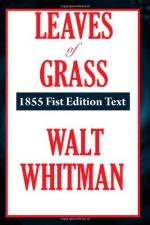
|
| Name: _________________________ | Period: ___________________ |
This test consists of 15 multiple choice questions and 5 short answer questions.
Multiple Choice Questions
1. Whitman asks in his poems who may have learned the ______________ of the lessons that he has to teach.
(a) Truth.
(b) Completeness.
(c) Details.
(d) Broadness.
2. "And there is ______ to us of all that has ever come of races and days, or ever will come."
(a) Voice.
(b) Meaning.
(c) Spirit.
(d) Color.
3. Whitman addresses the reader in "To You," telling the reader he fears they are walking the walks of _____________.
(a) Dreams.
(b) Pain.
(c) Clouds.
(d) Armies.
4. The metaphor of __________ is used in relation to the plowman, tilling to life, while the harvester harvests in the end.
(a) Regeneration.
(b) Cycles.
(c) Death.
(d) Birth.
5. Where is the good place in Boston where Whitman wants to see the show from in the morning?
(a) At the corner.
(b) At the docks.
(c) At the church.
(d) At the diner.
6. For how many years in Manhattan has Whitman watched the parades of soldiers through the city?
(a) Twenty.
(b) Forty.
(c) Ten.
(d) Thirty.
7. Whitman includes a series of poems which pertain to forms of education from questions posed to _______ to tests and judgement.
(a) Teachers.
(b) Senators.
(c) Students.
(d) Principals.
8. What do mediums convey when they arrive and they are successful in the United States, according to Whitman?
(a) Half truths.
(b) Lies.
(c) Gospel.
(d) Truth.
9. Who does Whitman say the person in the poem "Europe" was paid to do?
(a) Cross the water.
(b) Leave the land untouched.
(c) Defile the People.
(d) Write the poems.
10. Which is the ancient country which Whitman seems to think is progressing into the future, much in the same way as America?
(a) India.
(b) Japan.
(c) China.
(d) Somalia.
11. Who is sultry with perfumes, with ample and flowing garments, florid with blood, hot with passion?
(a) Originatress.
(b) Mother Earth.
(c) Creatrix.
(d) Mistress.
12. Whitman says that he often looks up at the perfect __________ of the stars during walks in the night.
(a) Honor.
(b) Silence.
(c) Glow.
(d) Truth.
13. When Whitman sits and looks out into the world, he sees all the __________ and the agony without end.
(a) Peace.
(b) Justice.
(c) Meanness.
(d) Anger.
14. What was Whitman's voice like when he sang late in the night, according to his writing?
(a) Low.
(b) Sad.
(c) Whispered.
(d) Joyful.
15. Who does Whitman describe as being lean and sinewy with muscular legs, thinly clothed, and well trained?
(a) Pioneer.
(b) Teacher.
(c) President.
(d) Runner.
Short Answer Questions
1. Whitman says that he sings the songs of the glory of ___________, not God.
2. Though Whitman says he paints myriads of heads, he also says that he paints head without a ________.
3. The combination of justice and God, according to Whitman, can be blended together to make an immortal ___________.
4. What are NOT one of the images of people who sleep well, which Whitman includes in his poems for comparison?
5. What does Whitman say that one should hold up sternly in order for it to send something back?
|
This section contains 468 words (approx. 2 pages at 300 words per page) |

|




